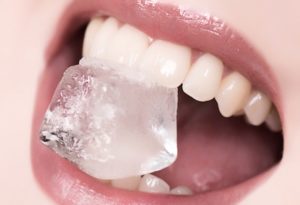Chewing on ice could harm your teeth
Restorative dentist San Diego
Chewing on ice is a popular habit. If you’re among those who loves to crunch the cubes in your glass, you’re certainly not alone. However, while it may be satisfying in the moment, the truth is that chewing on ice can be harmful to your teeth.
Why is ice harmful?
 Ice is particularly likely to cause tooth damage for two reasons. One is that it’s a very hard substance. Much like other hard items, like popcorn kernels, ice is capable of cracking tooth enamel, if you bite down on it hard enough or at just the right angle.
Ice is particularly likely to cause tooth damage for two reasons. One is that it’s a very hard substance. Much like other hard items, like popcorn kernels, ice is capable of cracking tooth enamel, if you bite down on it hard enough or at just the right angle.
The thing about ice that makes it particularly damaging is that it’s also cold. When ice touches the surface of your tooth enamel, it causes the enamel to become brittle. (This is what happens to many substances when they’re exposed to cold.) That makes the enamel more vulnerable to breaking. This is why chewing ice can be more harmful than chewing other substances that have similar hardness.
What can happen if you chew ice?
Chewing ice tends to cause cracks in the enamel of your teeth. At first, these cracks are very small, even microscopic. However, you might still experience some effects. There may be increased sensitivity of your teeth to cold, heat, sweets, or pressure, because the cracks make the enamel less protective of the inner layers of your teeth (where the nerves are). These small cracks also weaken the enamel and make it more likely that a more significant crack will occur.
When a more noticeable crack happens, Dr. Carpenter may be able to repair it using dental bonding. This may work if the crack is still fairly small and doesn’t extend into the deeper layers of the tooth. For a larger or deeper crack, a crown will be needed to strengthen the tooth. (This is a porcelain shell that’s placed around the tooth.)
If the crack extends into the deeper parts of the tooth, there’s a risk that bacteria will enter and cause an infection. This could require a root canal or even cause the loss of the tooth. It’s important to address any cracks as soon as possible in order to minimize the risk of this happening.
Restorative dentist San Diego
We recommend that you protect your teeth by avoiding chewing on ice. Some people are able to satisfy their urge to crunch by chewing on something else, such as carrot sticks. Others simply let the ice melt in their mouth instead of chewing it.
For many people, it’s just a habit that takes time to break. However, if you continue to have the urge to chew on ice, it can indicate a medical problem, such as iron deficiency. It’s not known why iron deficiency makes people more likely to crave chewing on ice or other non-food items, but the association is clear. Talk with your primary care doctor if you have a strong desire to chew on ice.
 If you’ve experienced a crack in a tooth, then it’s important to address this as soon as possible, to prevent serious complications and even the possible loss of the tooth. Dr. Carpenter is one of the premiere restorative dentists in the San Diego area, and can use his skills to get the best possible outcome for your smile. Please contact our office to schedule an appointment.
If you’ve experienced a crack in a tooth, then it’s important to address this as soon as possible, to prevent serious complications and even the possible loss of the tooth. Dr. Carpenter is one of the premiere restorative dentists in the San Diego area, and can use his skills to get the best possible outcome for your smile. Please contact our office to schedule an appointment.

